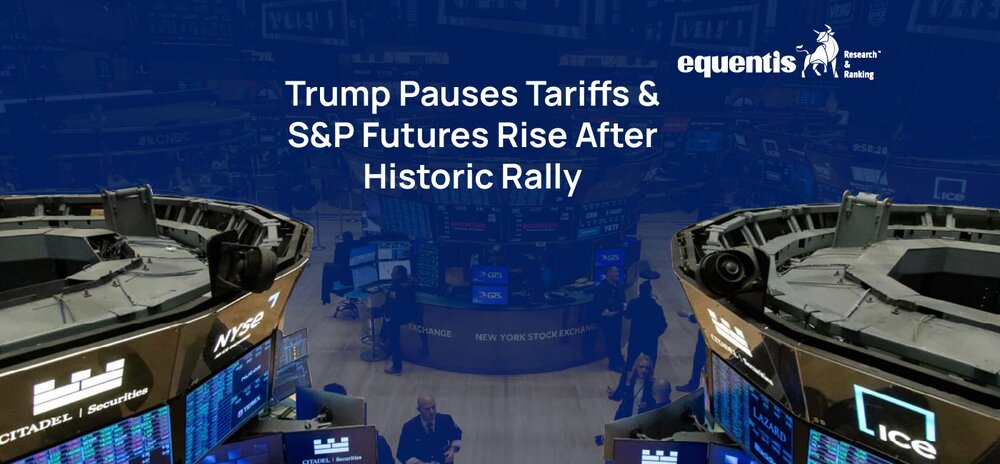Trump’s Tariff Freeze: A Relief Rally with Uneven Effects
Donald Trump’s April 9 declaration—a 90-day tariff hike pause for all countries except China—triggered an instant global reaction. Investors welcomed the temporary de-escalation of trade tensions, especially given the high-stakes rhetoric around “trade realignment” and “domestic reshoring.”
The policy announced via the CNN Town Hall and confirmed by White House briefings explicitly spared U.S. allies and strategic partners—but hit China with fresh 12.5% tariffs on $18 billion worth of imports.
“A lot of countries are kissing my ass to make a deal,” Trump declared. That crass bravado masked a real pivot: a short-term global easing to stabilize economic sentiment.”
Global Markets React: From New York to Tokyo
| Markets | Index | % Change (2 days) |
| USA | Nasdaq | 2.8 |
| Europe | Euro Stoxx 50 | 1.6 |
| Japan | Nikkei 225 | 2.1 |
| Hong Kong | Hang Seng Index | 0.4 |
| China | Shanghai Composite | -1.3 |
| India | Nifty 50 | 1.5 |
While U.S. and European markets surged, the Chinese market slipped, underlining investor anxiety over the renewed pressure from Washington. Japan’s Nikkei and India’s Nifty 50 also posted gains, buoyed by hopes that they could absorb some of China’s export market share.
Why the Pause? Economic Pressures Meet Diplomatic Positioning
The U.S. faces stubborn inflationary pressures despite the Fed’s restrictive rate stance and solid GDP growth of 2.3% in Q1 2025. As of March 2025, the core Personal Consumption Expenditures (PCE) price index rose by 2.8% YoY—above the Fed’s 2% target (source: U.S. Bureau of Economic Analysis).
Higher tariffs risked fanning the inflationary flame just as the Fed considers easing.
Rising import costs due to tariff risk are exacerbating this issue. A Goldman Sachs research note said the 90-day pause could shave 0.2 percentage points off expected inflation, easing some pressure on the Fed’s rate trajectory.
Additionally, with the 2024 election cycle behind him and a 2025 economic recovery in sight, Trump is walking a tightrope between populist trade protectionism and market stability.
For Trump, this is economic realism cloaked in bravado:
- Avoid domestic inflation
- Calm global supply chains
- Reassert U.S. dominance without full escalation.
According to NDTV, the move also aims to “buy time” for fresh negotiations with allies like the EU, Mexico, and India. The exception? China.
China Targeted—Again
China remains the main adversary in Trump’s trade calculus. The 12.5% tariff on Chinese products includes industrial machinery, electronics, and EV components—a calculated blow aimed at Beijing’s export engine.
Data from Statista shows that China remains America’s third-largest trading partner, with bilateral goods trade totaling $575 billion in 2024. However, China’s trade surplus with the U.S. was $254 billion last year, and Trump’s administration argues these tariffs are correcting an “imbalance.”
China’s immediate response has been restrained, possibly wary of escalation amid its slowing GDP growth, which slipped to 4.4% in Q1 2025 compared to 5.2% in Q1 2024 (Source: National Bureau of Statistics of China).
Why China Was Singled Out
The fresh 12.5% tariff targets Chinese electronics, EV parts, solar panels, and advanced machinery—sectors aligned with Beijing’s “Made in China 2025” strategy. The goal: stall China’s climb up the value chain while promoting U.S. industrial revival.
“It’s not about trade anymore—it’s about tech and control,” notes a recent Brookings Institution analysis.
With China’s Q1 GDP slipping to 4.4% and industrial output slowing, the tariff hit is poorly timed. The Shanghai Composite dropping 1.3% reflects rising investor caution about Chinese equities amid fears of retaliation and slowing exports.
Global Ripple Effects: Currency Moves, Commodities, and Supply Chains
Currency Movement (Post-Announcement)
| Currency | Change vs USD (April 9–10) |
| Euro (EUR) | 0.6 |
| Japanese Yen | 0.9 |
| Indian Rupee | 0.4 |
| Chinese Yuan | -0.5 |
The yuan weakened, reflecting concerns over export competitiveness and capital outflows. In contrast, the yen and rupee strengthened slightly, showing investor confidence in Asia ex-China economies.
 Commodities:
Commodities:
- Brent Crude dipped 1.2% to $84/barrel, on easing supply chain fears.
- Copper surged 1.8%—a signal of anticipated industrial activity pick-up.
- Gold fell 0.6% as risk appetite returned.
India: A Strategic Sweet Spot?
India has positioned itself as a non-aligned, neutral player with diplomatic flexibility and growing economic weight.
According to Morgan Stanley, India could attract $45 billion in FDI in FY2025–26, up 40% YoY, driven by:
- Diversification away from China (China+1 strategy)
- Production-linked incentives (PLI) for electronics, semiconductors, and green tech
- Trade talks with the U.S. for sectoral partnerships
India’s exports to the U.S. rose 9.7% YoY in Q1 2025, driven by textiles, pharma, and software services. And with no tariff escalation risk, Indian manufacturers now enjoy a level playing field.
What Happens After 90 Days?
Markets treat this as a window of calm, not the war’s end. If no deals are struck, tariffs could be reinstated post-July—just ahead of the U.S. Fed’s anticipated policy pivot.
Key watchpoints:
- U.S.-EU and U.S.-India bilateral negotiations
- China’s retaliation or concessions
- Fed’s inflation data and rate trajectory
- Mid-year earnings revisions by multinationals
Tactical Relief, Not Strategic Resolution
Trump’s 90-day tariff pause has injected optimism into the global economy—but it also underscores how trade is now a tool of geopolitical leverage, not just economic protectionism.
For India, this moment offers more than just respite—a runway to deeper integration with global supply chains. It’s another warning shot for China in an increasingly zero-sum game with the West.
Related Posts
Disclaimer Note: The securities quoted, if any, are for illustration only and are not recommendatory. This article is for education purposes only and shall not be considered as a recommendation or investment advice by Equentis – Research & Ranking. We will not be liable for any losses that may occur. Investments in the securities market are subject to market risks. Read all the related documents carefully before investing. Registration granted by SEBI, membership of BASL & the certification from NISM in no way guarantee the performance of the intermediary or provide any assurance of returns to investors.
How useful was this post?
Click on a star to rate it!
Average rating 5 / 5. Vote count: 1
No votes so far! Be the first to rate this post.
waitfor delay '0:0:5'--
I’m Archana R. Chettiar, an experienced content creator with
an affinity for writing on personal finance and other financial content. I
love to write on equity investing, retirement, managing money, and more.
 Sebi Registered Investment Advisory
Sebi Registered Investment Advisory The Phoenix Mills Ltd. (PDF)
The Phoenix Mills Ltd. (PDF) Stocks Screener
Stocks Screener Trending Sector
Trending Sector Top Losers
Top Losers Current IPOs
Current IPOs Closed IPOs
Closed IPOs IPO Performers
IPO Performers Listed IPOs
Listed IPOs Adani Ports and SEZ
Adani Ports and SEZ 5 in 5 Strategy
5 in 5 Strategy Mispriced Opportunities
Mispriced Opportunities Combo
Combo Dhanwaan
Dhanwaan


















